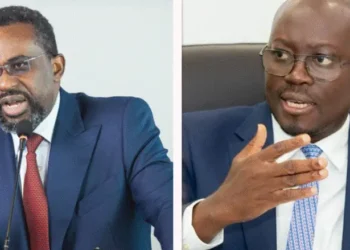Director of the Institute of Statistical, Social and Economic Research (ISSER), Prof. Peter Quartey, has urged the government to reduce its appointees and use the savings to fund the 2023 budget.
According to him, the country’s fiscal space is very much limited and would need innovative revenue measures to stabilize the economy.
This forms part of fiscal measures suggested by the Economist to be included in the 2023 budget which is set to be presented on the floor of parliament later this month.
“Government said it is going to pursue an austere budget…I expect a step further. I think there should be a reduction in the number of government appointees and how much is spent on them and many other areas, it would go a long way to help streamline our fiscal position.”
Prof. Peter Quartey
With regard to revenue generation, Prof. Peter Quartey commended the Ghana Revenue Authority (GRA) for its recent initiative of the E-VAT Invoicing system.
The E-VAT Invoicing system was introduced to help the GRA monitor the issuance of VAT by companies and will also deal with the inaccuracies associated with the filing of VAT by companies.
The ISSER Director believes that the 2023 budget should introduce more of such policies to maximize the country’s revenue generation.
“We want to see more of that and I think it is a step in the right direction. We need to enforce that and raise our revenue upstream and so these are some of the innovative measures that we want to see; that we aggressively pursue our revenue mobilization without destroying the base.”
Prof. Peter Quartey
The major problem now is rising debt, which stands above 80% of GDP and is projected to reach 104% by the end of 2022 by the World Bank. With the country currently unable to access funds on the international capital markets, it is clear that revenue mobilization is one of the key areas that need to be improved.
Need for new revenue mobilization measures
In a recent analysis, the Institute for Security Studies (ISS) also called for new revenue mobilization measures, including the implementation of the newly passed tax exemption bill, which has clear eligibility criteria and provides for monitoring and evaluation. The new bill, according to the ISS, could reduce tax exemptions to at least GHS500 million (US$66.7 million).
Using technology, the ISS noted that the government could improve property tax collection, which has been sporadic and low due to poor information about ownership and accurate valuations.
The extractive industry could bring in revenue if the tax regime is tightened and properly implemented, it stated, adding that the government must also seal the leaks at ports to realize more from excise and import duties.
It also urged Parliament to enact legislation to establish a debt limit and cap government borrowing to prevent the crisis from recurring. In this regard, constitutional amendments to limit the number of ministers and appointees in government, abolish ex-gratia payments and review emoluments to public servants must be considered.
Though outcome of the negotiations between government and the International Monetary Fund (IMF) may delay the budget presentation, according to the Majority Leader, Hon. Osei Kyei-Mensah-Bonsu, government is expected to announce further expenditure cutting measures while promoting the stability of the local currency.
READ ALSO: Ghana Committed To Increasing Share Of Renewable Energy- Prez. Akufo-Addo





















